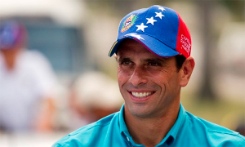BY NATASHA BARSOTTI — “If I were gay I’d take ownership of it with pride and shout it to the four winds, and I would have no problem loving whoever I had to love with my heart,” Venezuela’s interim president, Nicolás Maduro, reportedly said, according to a translation of his comments on the blog Blabbeando. ![]()
Maduro was rejecting charges that he is homophobic.
During a rally last week, Maduro told the crowd he’s someone who likes women. In televised comments reacting to Maduro’s assertions, political opponent Henrique Capriles says Maduro was being homophobic and taking an indirect swipe at him.
“If that’s how you want to attack me, let it be, but from here on I will always demand respect for all. You cannot talk of inclusion if there is exclusion,” Capriles is quoted as saying. 
Maduro, who is late president Hugo Chavez’s chosen successor, has been in a war of words about homophobia and sexual orientation with Capriles in the leadup to the April 14 election in Venezuela.
According to Blabbeando, a couple of queer organizations defended Maduro. Venezuela’s Sexually Diverse Revolutionary Front said that the interim president’s comments were taken out of context, with media leaving out the last part of his statement, which it highlighted in caps: “I am someone who likes women, and here I have one. It’s great how one feels when one kisses a woman, OR THE PERSON ONE LOVES.”
But Maduro’s campaign has questioned Capriles’s sexuality in the past, with Maduro himself calling the opposition “faggot fascists” when Capriles ran against Chavez in 2012.
The outcry against Maduro’s comments then forced him to make what was termed “a semi-apology” in which he said people were manipulating what he was trying to say. “We all respect the militant sexual diversity community that is active within the Venezuelan United Socialist Party, our organization, Maduro said. “Even in the Foreign Ministry – where I work – they always have known that we respect them and that we have done our work without treating them any different.
“If someone from the sexual diversity community felt bothered or discriminated against, I apologize. I am sorry. There is room, within that expression, for someone to have felt somehow offended by an expression that had a different connotation . . . There is no reason why I should delve into anyone’s sexual condition. That of our adversaries, the opposition’s candidate, their leadership or anyone. Each person is free to do what they want with their lives to achieve happiness.”
Reuters reports the Venezuela Affirmative Union as saying that Maduro’s latest comments signal that he has “relapsed and shown a homophobic attitude that seeks to appeal to Latin America’s macho culture in order to denigrate the opposition candidate and take votes off him.”
The Sexually Diverse Revolutionary Front feels that both sides need to check their rhetoric. “Hugo Chavez’s policies have promoted inclusion and non-discrimination for 14 years,” according to the group’s president, Luis Meneses.
“We condemn the use of discriminatory words or images, wherever they come from. Both sides need to show tolerance and respect.”
Landing image:la-razon.com

 Why you can trust Xtra
Why you can trust Xtra


